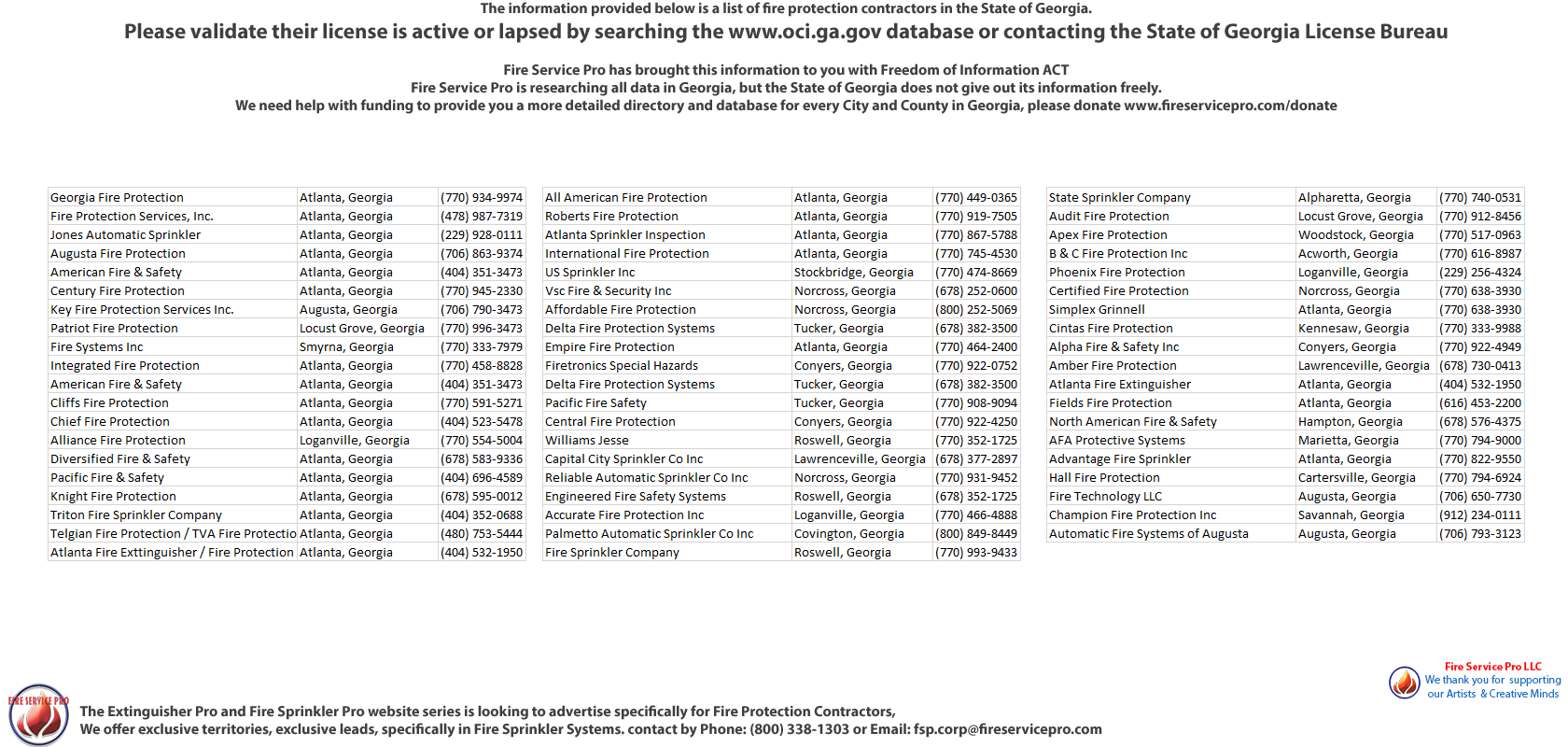Atlanta
Commercial Fire Sprinkler Inspection
In commercial buildings and structures Atlanta County has implemented fire codes, rules and regulations that are not only good to comply with, but have the ability to prevent the devastating effects of fire and help save lives. Inspections can be completed by you, maintenance engineers and by a properly licensed fire contractor they comprise of a series of checking and testing the components that make the fire protection system. Ensuring all fire detection alarms, fire alarms, fire sprinklers, fire hydrants, fire suppression systems, fixed systems, and fire extinguishers are functioning.
When you are doing the inspection of your fire sprinkler system, mainly you’re making sure all components and alarms are working, and keep an eye for any leaks or possible issues with the fire protection system.
The State of California may also have additional inspections required to be completed by a licensed fire contractor. Contact your local fire marshal for details regarding inspections and certifications that may be required on your commercial building, or structure.
Fire sprinkler inspections as recommended by the National Fire Protection Association (NFPA), NFPA states that a, “Minimum requirement for the periodic inspection, testing, and maintenance of water-based fire protection systems, including land-based and marine applications. 1.1.1 This standard does not address all of the inspection, testing, and maintenance of the electrical components of the automatic fire detection equipment for pre-action and deluge systems that are addressed by NFPA 72, National Fire Alarm Code. The inspection, testing, and maintenance required by this standard and NFPA 72, National Fire Alarm Code, shall be coordinated so that the system operates as intended. 1.1.2 The types of systems addressed by this standard include, but are not limited to, sprinkler, standpipe and hose, fixed water spray, and foam water. Included are the water supplies that are part of these systems, such as private fire service mains and appurtenances, fire pumps and water storage tanks, and valves that control system flow. The document also addresses impairment handling and reporting. This standard applies to fire protection systems that have been properly installed in accordance with generally accepted practices. Where a system has not been installed in accordance with generally accepted practices, the corrective action is beyond the scope of this standard. The corrective action to ensure that the system performs in a satisfactory manner shall be in accordance with the appropriate installation standard. 1.1.3 This standard shall not apply to sprinkler systems designed and installed in accordance with NFPA 13D, Standard for the Installation of Sprinkler Systems in One- and Two-Family Dwellings and Manufactured Homes. A.1.1 generally accepted NFPA installation practices for water-based fire protection systems relevant to this standard are found in the following: NFPA 13, Standard for the Installation of Sprinkler Systems. NFPA 13R, Standard for the Installation of Sprinkler Systems in Residential Occupancies up to and Including Four Stories in Height. NFPA 14, Standard for the Installation of Standpipe and Hose Systems. NFPA 15, Standard for Water Spray Fixed Systems for Fire Protection. NFPA 16, Standard for the Installation of Foam-Water Sprinkler and Foam-Water Spray Systems. NFPA 20, Standard for the Installation of Stationary Pumps for Fire Protection. NFPA 22, Standard for Water Tanks for Private Fire Protection. NFPA 24, Standard for the Installation of Private Fire Service Mains and Their Appurtenances. NFPA 750, Standard on Water Mist Fire Protection Systems. For systems originally installed in accordance with one of these standards, the repair, replacement, alteration or extension of such systems should also be performed in accordance with that same standard. When original installations are based on other applicable codes or standards, repair, replacement, alteration, or extension practices should be conducted in accordance with those other applicable codes or standards.” (National Fire Protection Association: Ref. http://www.nfpa.org/aboutthecodes/AboutTheCodes.asp?DocNum=25)
A properly functioning fire protection system will help prevent fire, save personal and business effects, a possible reduction in your fire hazard policy (check with your fire hazard insurance provider for details) and most importantly save lives.
 |
||
| Atlanta Fire & Safety Protection Company | (678) 340-FIRE (3473) |
|
|
Atlanta, Georgia Fire Protection
Installers & Technicians in Atlanta, Georgia
Atlanta Fire Protection Company
|
Enter your cell, home or work phone number you wish to use. Google Voice will directly connect you with the Atlanta Fire Protection Company Toll Free in the US. |
Contact About Us Our Services |
 |
||
No comments:
Post a Comment